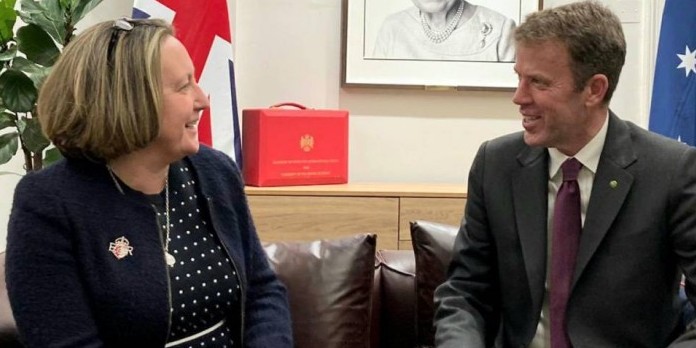The UK-Australia trade deal opening up trade on a range of agricultural and other product does not cover pork, poultry and eggs, the final agreement shows.
The Government said the Free Trade Agreement would unlock £10 billion in extra trade, although NFU president Minette Batters said there was nothing in it for farmers.
The deal, agreed in principle in June by Liz Truss, was signed by Anne-Marie Trevelyan, who succeeded her as International Trade Secretary, on Thursday night .
‘Our UK-Australia trade deal is a landmark moment in the historic and vital relationship between our two commonwealth nations. This agreement is tailored to the UK’s strengths, and delivers for businesses, families, and consumers in every part of the UK – helping us to level up,” she said.
There are big implications for the UK agricultural sector.
There will be Tariff Rate Quotas (TRQ’s) on beef and sheep-meat imports. These tariffs are set at 35,000t for beef and 25,000t for sheep-meat, increasing at regular annual increments over 10 years to reach 110,000t for beef and 75,000t for sheep-meat by year 10. Any product exceeding this quantity will be subject to the UK Most Favoured Nation (MFN) tariffs.
From years 10 to 15 there will be product-specific safeguards, which in effect increase the tariff-free beef imports incrementally to 170,000t and sheep-meat to 125,000t by Year 15, with a 20% tariff on any imports that exceed this quantity.
But summarising what the deal means for levy payers, AHDB strategic insight manager Sarah Baker said: “Surprisingly, pork – along with poultry and eggs – is not included in the FTA and therefore Australian pork exports will attract UK MFN tariffs.”
On the face of it, this is not hugely significant as Australia is a net importer of pork and is unlikely to be sending pork to the UK, even under the new liberalised regime. The UK can still export to Australia tariff free, as it does currently.
However, it does mean that no precedent has been set for future deals with big pork exporters, such as the US.
Ms Baker highlighted that, running in parallel to the TRQ’s will be a general bilateral safeguard. This stipulates that if a domestic industry suffers injury due to the FTA, trade can be suspended immediately for an initial period of 200 days, while the extent of injury is investigated.
Agreement needs to be reached between the parties regarding the extent of injury before trade is resumed. This applies to all products covered in the FTA and remains in force for 15 years.
“With regard to animal welfare, a non-regression clause has been included for the first time in a UK FTA that ensures that neither party can regress on current animal welfare standards in order to undercut the other party on price,” she added.
There is also a clear commitment to climate change within the agreement, another first for a UK FTA. Both parties are committed to climate change targets outlined in the Paris agreement and will work towards achieving these targets over the lifetime of the agreement.
Ms Baker added: “The agreement creates a gateway to acceding to the Comprehensive and Progressive Trans-Pacific Partnership, (CPTPP), which would gain the UK access to a rapidly expanding middle class of consumer. By 2030, two-thirds of the middle classes will be in Asia, driving demand for high-quality products including meat and dairy in the region.
“This rapidly-expanding demand will dominate trade patterns and access to these markets will be crucial for the UK as it pursues its stated goal to become a great trading nation.
“The agreement will not take effect overnight. The complex process that needs to take place, which will include a three-month period of public scrutiny, Trade and Agricultural Commission (TAC) scrutiny and then government and parliamentary process, means that it is unlikely to be in force before the second half of 2023.”
One-sided deal
But NFU President Minette Batters described it as a ‘one-sided deal’. “As we feared following the agreement in principle, there appears to be extremely little in this deal to benefit British farmers,” she said. “When it comes to agriculture, the Australians have achieved all they have asked for and British farmers are left wondering what has been secured for them.
“In particular, it is disappointing that the UK government has capitulated to Australian demands to time-limit any safeguards for sensitive sectors. Despite assurances that these sectors would be afforded some level of protection, we will see full liberalisation of dairy after just six years, sugar after eight years and beef and lamb after 15 years.
“There will also be no safeguards available for any products if imports reach damaging levels after that 15 years is up. Just as concerningly, the UK has agreed to beef and lamb quotas which will favour imports of high-value cuts, despite this being the end of the market where British farmers tend to derive any value from their hard work.
“It’s also difficult to discern anything in this deal that will allow us to control imports of food produced below the standards legally required of British farmers, for instance on land deforested for cattle production or systems that rely on the transport of live animals in a way that would be illegal here.
“The government needs to level with farmers about the commercial reality of this and ditch the soundbites that lost any meaning a long time ago.”




